Health benefits from drinking coconut water: A Natural Elixir. This tropical beverage, revered for centuries, has recently gained widespread popularity for its refreshing taste and impressive nutritional profile. Coconut water, the clear liquid found inside young coconuts, is a natural powerhouse packed with electrolytes, vitamins, and antioxidants, offering a myriad of health benefits that range from promoting hydration and digestion to supporting heart health and enhancing skin radiance.
Beyond its refreshing qualities, coconut water is a natural source of essential nutrients that contribute to overall well-being. Its rich electrolyte content, particularly potassium, makes it an ideal choice for replenishing fluids lost during exercise or illness. Moreover, coconut water is a good source of vitamins, including B vitamins, vitamin C, and vitamin E, which are crucial for various bodily functions.
Coconut Water: A Natural Elixir
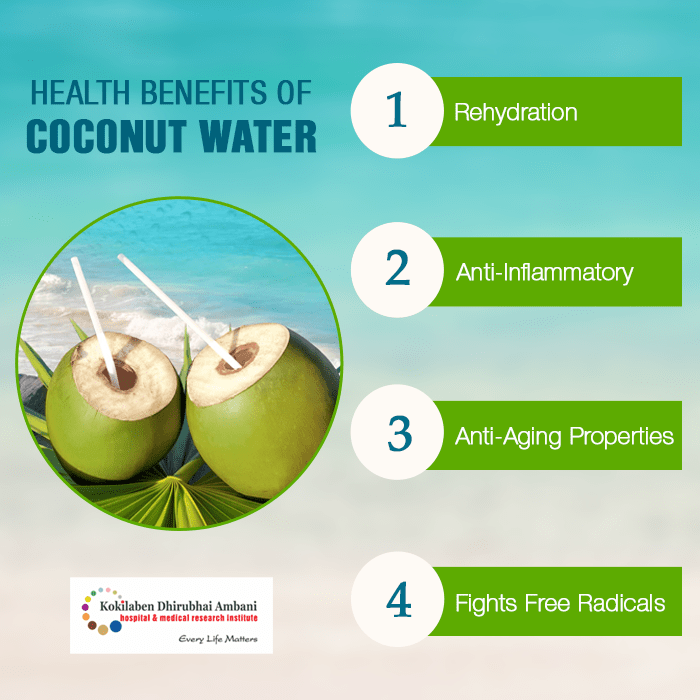
Coconut water, the clear liquid found inside young coconuts, has been enjoyed for centuries for its refreshing taste and health benefits. From tropical shores to bustling cities, this natural elixir has gained popularity worldwide, with people recognizing its diverse nutritional value.
The Origins and History of Coconut Water Consumption
Coconut water’s origins can be traced back to the tropical regions of Southeast Asia, where the coconut palm (Cocos nucifera) thrives. The earliest recorded evidence of coconut water consumption dates back to ancient civilizations in India, where it was used for both sustenance and medicinal purposes.
In traditional medicine systems, coconut water was believed to possess cooling and purifying properties, making it a valuable remedy for various ailments. Over time, coconut water’s popularity spread throughout the Pacific Islands, South America, and eventually to other parts of the world.
It became a staple beverage in many tropical cultures, offering a natural source of hydration and electrolytes.
The Nutritional Composition of Coconut Water
Coconut water is a rich source of essential electrolytes, vitamins, and minerals, making it a natural sports drink and a healthy alternative to sugary beverages.Here’s a breakdown of the key nutrients found in coconut water:
- Electrolytes:Coconut water is particularly known for its high content of electrolytes, including potassium, sodium, magnesium, and calcium. These electrolytes play a crucial role in maintaining fluid balance, muscle function, and nerve transmission.
- Vitamins:Coconut water contains a variety of vitamins, including vitamin C, which is an antioxidant that supports immune function, and B vitamins, which are essential for energy metabolism.
- Minerals:Coconut water is a good source of minerals like manganese, which supports bone health, and phosphorus, which is important for energy production.
Coconut Water vs. Coconut Milk
Coconut water and coconut milk are both derived from the coconut, but they have distinct properties and uses.
Coconut water is a refreshing and healthy beverage, packed with electrolytes and nutrients. If you’re looking for a way to stay hydrated and support your overall well-being, consider incorporating it into your daily routine. Perhaps you’d like to join a fitness-focused environment like Planet Fitness, where you can find a variety of jobs near you at planet fitness jobs near me.
Staying active and making healthy choices, like drinking coconut water, can contribute to a fulfilling and energetic lifestyle.
- Coconut wateris the clear liquid found inside young coconuts. It is naturally low in fat and calories, making it a refreshing and hydrating beverage.
- Coconut milk, on the other hand, is extracted from the white flesh of mature coconuts. It is a creamy, white liquid that is higher in fat and calories than coconut water. Coconut milk is commonly used in cooking and baking to add flavor and richness to dishes.
Hydration and Electrolyte Balance
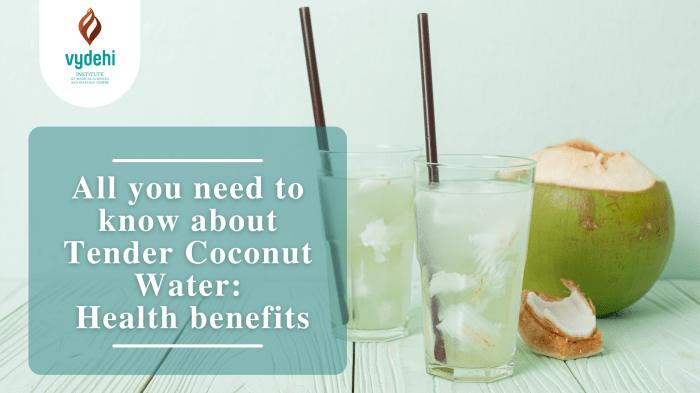
Coconut water is a natural source of electrolytes, making it an excellent choice for rehydration, especially after exercise or illness. Electrolytes are minerals that carry an electrical charge and are essential for various bodily functions, including nerve transmission, muscle contraction, and fluid balance.
Coconut water is a refreshing and nutritious beverage that offers various health benefits, from hydrating your body to supporting your immune system. It’s a natural source of electrolytes, which can be especially helpful after a workout or during times of illness.
Speaking of “times of illness,” the lyrics from “Evermore” in Beauty and the Beast remind us of the power of love and the importance of staying true to ourselves, even when faced with challenges, evermore from beauty and the beast lyrics.
Just like love can overcome adversity, coconut water can help you stay healthy and strong, so consider incorporating it into your diet for a boost of natural goodness.
Electrolyte Content of Coconut Water
Coconut water contains a balanced blend of electrolytes, including potassium, sodium, magnesium, and calcium. This makes it a natural and effective way to replenish electrolytes lost through sweating or illness. Here’s a comparison of the electrolyte content of coconut water to other popular beverages:
| Beverage | Potassium (mg/100 ml) | Sodium (mg/100 ml) | Magnesium (mg/100 ml) | Calcium (mg/100 ml) |
|---|---|---|---|---|
| Coconut Water | 250-300 | 20-30 | 10-15 | 20-30 |
| Sports Drinks | 40-60 | 40-50 | 5-10 | 2-5 |
| Orange Juice | 200-250 | 5-10 | 5-10 | 20-30 |
| Water | 0 | 0 | 0 | 0 |
Coconut water’s electrolyte profile closely resembles that of sports drinks, making it a viable alternative for athletes and individuals engaging in intense physical activity. It also provides a natural source of hydration without the added sugars and artificial flavors found in many commercial sports drinks.
Coconut Water for Rehydration
Coconut water is particularly effective for rehydration after exercise or illness due to its ability to replace lost fluids and electrolytes. It helps restore the body’s fluid balance and promotes faster recovery.
“Coconut water is a natural source of electrolytes, making it an excellent choice for rehydration, especially after exercise or illness.”
Coconut water’s natural composition and low sugar content make it a healthier alternative to traditional sports drinks. It can also be beneficial for individuals suffering from dehydration due to illness or diarrhea.
Coconut water is a refreshing and hydrating beverage that offers a range of health benefits, from boosting electrolyte levels to supporting healthy digestion. Beyond its internal benefits, it’s also a great source of natural electrolytes, which can be helpful for maintaining healthy skin.
If you’re looking for products to enhance your skin’s health, you might want to check out beauty store ulta , which carries a wide variety of skincare products. Of course, drinking coconut water alone can’t replace a complete skincare routine, but it can definitely contribute to a healthy glow from within.
Digestive Health and Gut Health
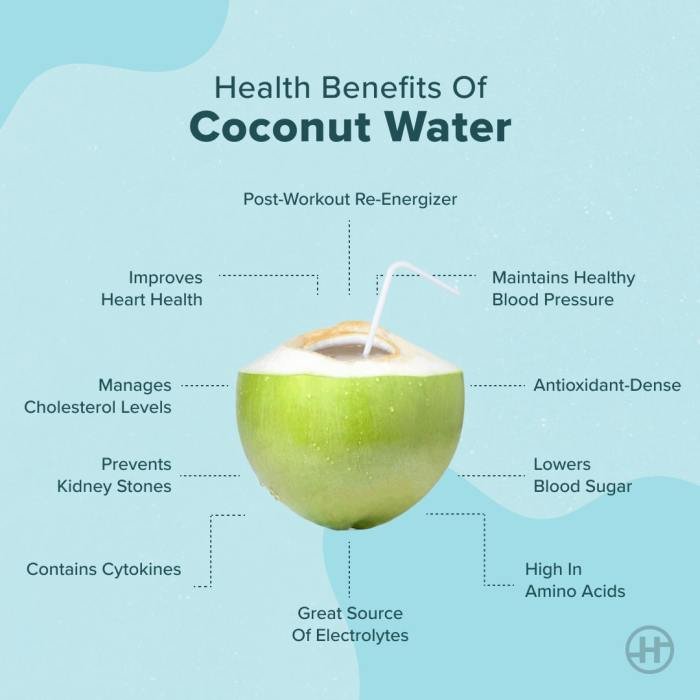
Coconut water’s potential benefits for digestion extend beyond its hydrating properties. It contains natural electrolytes and fiber, which play crucial roles in maintaining a healthy digestive system.
Fiber Content and Digestive Support
Coconut water contains a moderate amount of dietary fiber, primarily in the form of soluble fiber. Soluble fiber absorbs water in the digestive tract, forming a gel-like substance that helps regulate bowel movements and promotes regularity.
Fiber is essential for digestive health, contributing to a feeling of fullness, preventing constipation, and supporting the growth of beneficial bacteria in the gut.
By adding coconut water to your diet, you can potentially enhance your fiber intake and support a healthy digestive process.
Probiotics and Gut Microbiome
While coconut water itself doesn’t contain significant amounts of probiotics, its natural sugars can act as a prebiotic, providing food for the beneficial bacteria in your gut.
Prebiotics are non-digestible fibers that stimulate the growth of beneficial bacteria in the gut, promoting a healthy gut microbiome.
A healthy gut microbiome is crucial for overall health, influencing digestion, immunity, and even mental well-being.
Incorporating Coconut Water into a Digestive Diet
Coconut water can be easily incorporated into a healthy digestive diet. It can be enjoyed as a refreshing beverage on its own or used in smoothies, juices, and other recipes.
- Start your day with a glass of coconut water for hydration and digestive support.
- Blend coconut water with fruits, vegetables, and yogurt for a nutritious and digestive-friendly smoothie.
- Use coconut water as a base for homemade soups and sauces, adding a touch of sweetness and electrolytes.
Heart Health and Blood Pressure
Coconut water’s potential benefits for heart health stem from its rich potassium content. This electrolyte plays a crucial role in regulating blood pressure and maintaining a healthy cardiovascular system.
Potassium’s Role in Heart Health
Potassium helps regulate blood pressure by counteracting the effects of sodium, a mineral that can increase blood pressure when consumed in excess. When potassium levels are adequate, it helps relax blood vessels, improving blood flow and reducing strain on the heart.
Coconut Water and Blood Pressure Regulation
Research suggests that consuming coconut water may contribute to blood pressure regulation. A study published in the Journal of the American College of Nutrition found that drinking coconut water for four weeks significantly reduced systolic blood pressure in individuals with prehypertension.
Tips for Incorporating Coconut Water into a Heart-Healthy Lifestyle
Incorporating coconut water into a heart-healthy lifestyle can be as simple as replacing sugary beverages with this natural alternative.
- Enjoy it as a refreshing drink: Coconut water is a natural and delicious way to stay hydrated and replenish electrolytes.
- Add it to smoothies: Coconut water can add a unique flavor and nutritional boost to smoothies.
- Use it in cooking: Coconut water can be used as a base for soups, stews, and sauces, adding a subtle sweetness and a boost of electrolytes.
Skin Health and Antioxidants
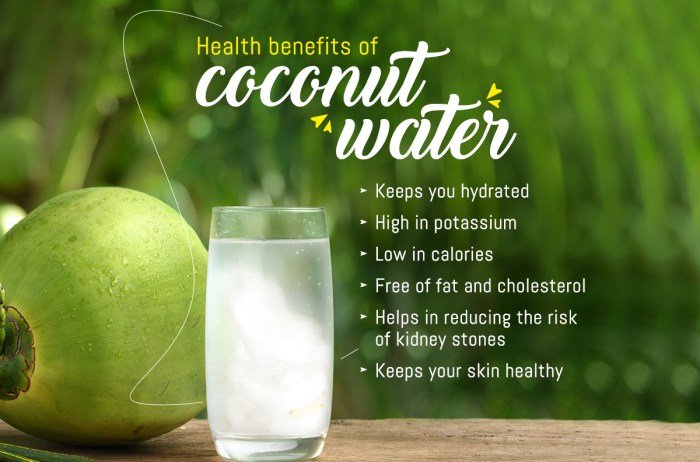
Coconut water’s benefits extend beyond hydration and electrolyte replenishment. It also offers a range of advantages for skin health, thanks to its rich antioxidant and hydrating properties.
Hydration and Skin Health
Adequate hydration is crucial for maintaining healthy skin. Coconut water, with its high water content, effectively hydrates the body from within, contributing to a radiant complexion. Dehydration can lead to dry, flaky skin, while sufficient hydration promotes skin elasticity and suppleness.
Antioxidants and Skin Protection
Coconut water is a natural source of antioxidants, including vitamin C and polyphenols. These antioxidants combat free radicals, which can damage skin cells and contribute to premature aging. By neutralizing free radicals, coconut water helps protect the skin from oxidative stress, reducing wrinkles and promoting a youthful appearance.
Collagen Production and Skin Elasticity
Coconut water contains silica, a mineral that plays a vital role in collagen production. Collagen is a protein that provides structure and elasticity to the skin. Increased collagen production can improve skin firmness and reduce the appearance of fine lines and wrinkles.
Anti-Inflammatory Properties
Coconut water exhibits anti-inflammatory properties due to its rich content of electrolytes and antioxidants. Inflammation can contribute to skin conditions like acne and eczema. By reducing inflammation, coconut water can help soothe irritated skin and promote healing.
Ways to Use Coconut Water for Skin Care
Coconut water can be incorporated into various skin care routines:
| Method | Benefits | Instructions |
|---|---|---|
| Direct Application | Hydration, antioxidant protection | Apply coconut water directly to the skin using a cotton ball or spray bottle. Allow it to dry naturally. |
| Facial Mask | Hydration, exfoliation, anti-aging | Mix coconut water with ingredients like yogurt, honey, or oatmeal to create a facial mask. Apply the mask to the face and leave it on for 15-20 minutes before rinsing. |
| Skin Toner | Hydration, pH balance, anti-inflammatory | After cleansing, apply coconut water to the skin with a cotton ball. It can help to tighten pores and soothe irritation. |
| Hair Rinse | Hydration, shine, anti-frizz | After shampooing and conditioning, rinse hair with coconut water. It can leave hair soft, shiny, and manageable. |
Potential Benefits for Athletes and Fitness Enthusiasts: Health Benefits From Drinking Coconut Water
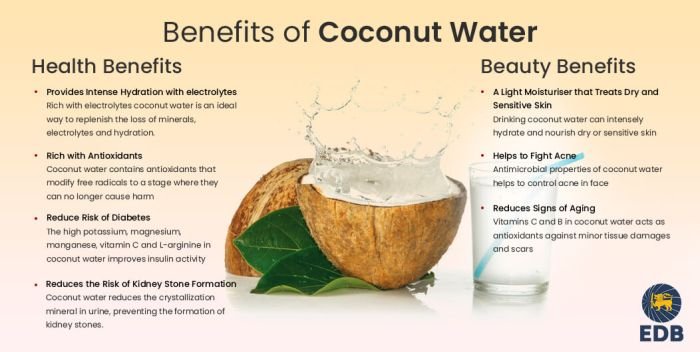
Coconut water, with its natural electrolyte balance and hydrating properties, has garnered attention as a potential performance enhancer for athletes and fitness enthusiasts. It’s often touted as a natural alternative to traditional sports drinks, offering a refreshing and nutritious way to replenish fluids and electrolytes lost during intense workouts.
Muscle Recovery and Performance
Coconut water’s potential benefits for athletes extend beyond hydration. Its rich electrolyte content, particularly potassium, plays a crucial role in muscle recovery and function. Potassium is essential for muscle contraction and relaxation, and its replenishment after exercise can help reduce muscle fatigue and soreness, contributing to faster recovery and improved performance.
Research on Coconut Water’s Impact on Athletic Performance and Endurance
While research on coconut water’s impact on athletic performance is still ongoing, some studies have shown promising results. A study published in the
International Journal of Sports Nutrition and Exercise Metabolism* found that coconut water was as effective as a commercial sports drink in improving hydration and performance during prolonged exercise.
Another study, published in theJournal of the International Society of Sports Nutrition*, investigated the effects of coconut water on endurance performance. The study found that coconut water consumption led to significant improvements in time to exhaustion compared to a placebo.
Incorporating Coconut Water into an Athlete’s Diet and Training Regimen
Coconut water can be readily incorporated into an athlete’s diet and training regimen. It can be enjoyed as a refreshing post-workout drink, providing hydration and electrolytes lost during exercise. Athletes can also consider incorporating coconut water into their daily hydration plan, ensuring adequate fluid intake throughout the day.
- Pre-workout:While coconut water can be consumed before exercise, its sugar content may not be ideal for high-intensity workouts. Consider diluted coconut water or a combination of coconut water and water for pre-workout hydration.
- During workout:For shorter workouts, coconut water can be a suitable choice for hydration. However, for prolonged or intense exercise, a commercial sports drink with a higher carbohydrate content might be more appropriate.
- Post-workout:Coconut water is an excellent choice for post-workout recovery. Its electrolyte content helps replenish fluids and minerals lost during exercise, while its natural sugars provide energy for muscle recovery.
Coconut Water: A Versatile Ingredient
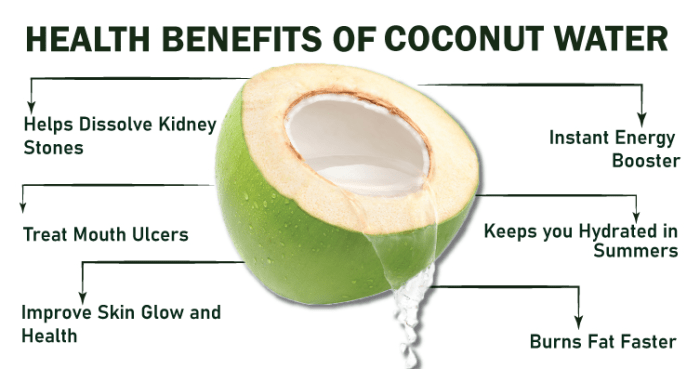
Coconut water’s versatility extends beyond its refreshing qualities. It can be seamlessly incorporated into various culinary creations, adding a unique flavor profile and nutritional boost.
Culinary Uses of Coconut Water
Coconut water’s mild sweetness and subtle flavor make it a versatile ingredient in various culinary applications. It can be used to enhance the taste and texture of soups, stews, and sauces. For example, coconut water can be used to create a flavorful base for Thai curries, adding a touch of sweetness and depth to the dish.
- Soups and Stews:Coconut water can be used as a base for soups and stews, adding a delicate sweetness and a hint of tropical flavor.
- Sauces:Coconut water can be incorporated into sauces to add a subtle sweetness and a creamy texture. It is particularly well-suited for Asian-inspired sauces.
- Marinades:Coconut water can be used as a marinade for chicken, fish, or tofu, adding moisture and a subtle sweetness to the meat.
- Rice Dishes:Coconut water can be added to rice dishes for a unique flavor and a touch of sweetness.
- Baked Goods:Coconut water can be used as a substitute for milk or water in baked goods, adding a subtle sweetness and a touch of moisture to the final product.
Coconut Water Smoothies, Health benefits from drinking coconut water
Coconut water is an excellent base for smoothies, adding a refreshing and hydrating element. It can be combined with various fruits, vegetables, and other ingredients to create a delicious and nutritious beverage.
Refreshing Coconut Water Smoothie
- Ingredients:
- 1 cup coconut water
- 1/2 cup frozen mango chunks
- 1/4 cup frozen pineapple chunks
- 1/2 banana, sliced
- 1 tablespoon spinach
- 1/2 teaspoon honey (optional)
- Instructions:
- Combine all ingredients in a blender.
- Blend until smooth.
- Pour into a glass and enjoy immediately.
Final Wrap-Up

Incorporating coconut water into your daily routine can be a simple yet effective way to enhance your overall health and well-being. Whether you enjoy it as a refreshing beverage, incorporate it into your culinary creations, or utilize its natural properties for skincare, the versatility of coconut water makes it a valuable addition to a healthy lifestyle.
So, embrace the natural goodness of this tropical elixir and unlock the numerous benefits it offers for your body and mind.
Question Bank
Is coconut water good for weight loss?
While coconut water is low in calories and can contribute to hydration, it is not a magic weight-loss solution. A balanced diet and regular exercise are crucial for weight management.
Can coconut water cause any side effects?
Coconut water is generally safe for consumption, but some individuals may experience mild side effects like diarrhea or bloating. If you have any pre-existing health conditions, consult your doctor before consuming large quantities of coconut water.
How much coconut water should I drink daily?
There is no set recommendation for daily coconut water intake. However, moderation is key. Drinking 1-2 servings per day is generally considered safe for most people.